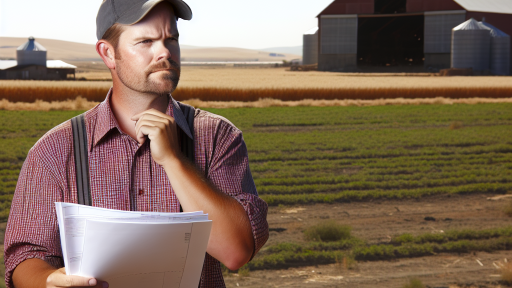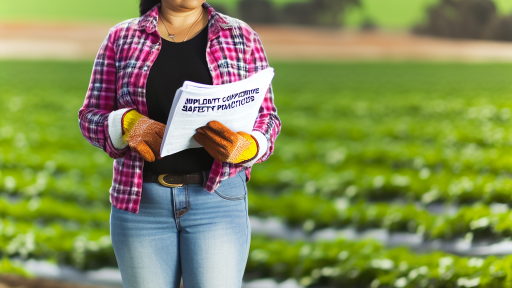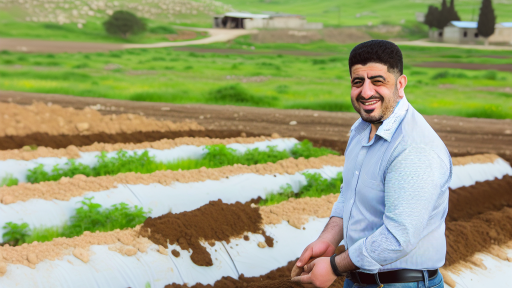Understanding the Current Landscape of Trade Policies Affecting Farming
Overview of Trade Policies
Trade policies significantly shape agricultural practices today.
Policymakers create regulations that govern cross-border farming operations.
These regulations affect everything from tariffs to export restrictions.
Consequently, farmers must stay informed about these evolving policies.
Key Players in Agricultural Trade Policy
Multiple stakeholders influence trade policies in agriculture.
Government agencies play a central role in policy formulation.
International organizations also contribute by establishing guidelines.
Furthermore, lobbying groups advocate for farmers’ interests.
Each player impacts how policies unfold in farming sectors.
Recent Changes in Trade Agreements
Recent trade agreements have introduced notable shifts for farmers.
Agreements often focus on reducing tariffs and promoting exports.
For instance, the U.S.-Mexico-Canada Agreement modified trade dynamics.
These changes affect pricing and the availability of agricultural goods.
The Role of Global Markets
Global market trends directly influence local farming conditions.
Farmers must adapt to fluctuating demand for their products.
Transform Your Agribusiness
Unlock your farm's potential with expert advice tailored to your needs. Get actionable steps that drive real results.
Get StartedThis demand may change based on international competition.
Consequently, understanding global trends is vital for success.
Impact of Regulatory Compliance
Compliance with trade regulations poses challenges for many farmers.
Farmers must navigate complex documentation and standards.
Non-compliance can result in penalties and market exclusion.
Thus, staying compliant is critical for maintaining market access.
Looking Ahead
As trade policies evolve, farmers face both risks and opportunities.
Staying proactive can help farmers adapt to changes effectively.
Ultimately, understanding the landscape can influence long-term success.
Analyzing the Impact of Trade Policy Shifts on Agricultural Markets
Understanding Trade Policy Shifts
Trade policy shifts influence agricultural markets significantly.
These changes often result from political negotiations and agreements.
Farmers must stay updated on trade relations.
Consequently, they can adjust their marketing strategies effectively.
Impact on Crop Prices
Changes in trade policy can lead to price volatility for crops.
For instance, tariffs on exports can reduce demand.
This situation drives down prices for farmers relying on export markets.
Conversely, increased demand from new trade agreements can elevate prices.
Shifts in Supply Chain Dynamics
Trade policy adjustments also reshape supply chain dynamics.
Farmers may face altered transportation costs due to tariffs.
Moreover, they might need to establish new supplier relationships.
This can lead to inefficiencies and increased operational costs.
Market Opportunities and Challenges
Trade policy shifts create both opportunities and challenges for farmers.
For instance, access to new markets can foster growth.
However, competition may intensify with opened markets.
Showcase Your Farming Business
Publish your professional farming services profile on our blog for a one-time fee of $200 and reach a dedicated audience of farmers and agribusiness owners.
Publish Your ProfileFarmers must adapt to stay competitive amid these changes.
Adjusting Farming Practices
To remain viable, farmers may need to adjust their practices.
Diversification of crops can help mitigate risks.
Additionally, adopting technology can improve efficiency.
Staying nimble allows farmers to respond quickly to market changes.
Implications for Agricultural Market Strategies
Trade policy shifts have profound implications for agricultural markets.
Farmers need to remain vigilant and adaptable.
By understanding these dynamics, they can navigate uncertainties effectively.
Strategies for Farmers to Navigate Tariffs and Trade Barriers
Embracing Market Diversification
Farmers should consider diversifying their markets to reduce reliance on one export destination.
This will help mitigate risks associated with sudden tariff changes.
Additionally, exploring new international markets can open up opportunities for growth.
Enhancing Supply Chain Resilience
Building a more resilient supply chain is essential in today’s trade environment.
Farmers can achieve this by establishing relationships with multiple suppliers.
Furthermore, investing in local partnerships can minimize disruption from trade barriers.
Utilizing Technology for Competitive Advantage
Leveraging technology can drive efficiency in farming operations.
Farmers should explore precision agriculture tools to optimize inputs and outputs.
Moreover, using data analytics can support better decision-making regarding market trends.
Engaging in Policy Advocacy
Active engagement in policy advocacy can benefit local farmers.
They can join industry associations to voice concerns about trade policies.
Furthermore, collaborating with policymakers can lead to favorable trade agreements.
Investing in Education and Training
Continual education and training are vital for farmers adapting to trade changes.
Farmers should engage in workshops to learn about new markets and regulations.
Additionally, utilizing resources from agricultural agencies can enhance knowledge.
Building Relationships with International Buyers
Establishing strong relationships with international buyers can create stability.
Farmers can attend trade shows to network with potential contacts.
Additionally, using platforms for direct communication can facilitate better deals.
Focusing on Quality and Sustainability
Emphasizing quality production can differentiate farmers in competitive markets.
Sustainable practices improve the appeal of agricultural products globally.
Moreover, obtaining certifications can enhance market access and recognition.
Discover More: Land Use Planning Strategies for Farmers
The Role of Government Support Programs in Mitigating Trade Disruptions
Understanding Trade Disruptions
Trade disruptions impact farmers significantly.
These disruptions can stem from various factors.
Policy changes often trigger unexpected market shifts.
As a result, farmers face uncertainties affecting their livelihoods.
Importance of Government Support
Government support programs are crucial during trade disruptions.
These programs provide financial aid to affected farmers.
Support helps stabilize incomes amid fluctuating markets.
Furthermore, it ensures food security for the nation.
Types of Government Support Programs
Various programs exist to assist farmers effectively.
Some programs focus on direct financial assistance.
Showcase Your Farming Business
Publish your professional farming services profile on our blog for a one-time fee of $200 and reach a dedicated audience of farmers and agribusiness owners.
Publish Your Profile- Grants provide immediate help for operational costs.
- Low-interest loans offer long-term financial relief.
Other programs promote market access and exporting.
- Trade adjustment assistance helps farmers adapt to global markets.
- Export incentives boost competitiveness abroad.
Effectiveness of Support Programs
Evaluating the effectiveness of these programs is essential.
Research shows that timely support mitigates severe impacts.
For instance, during previous trade disputes, programs showed positive outcomes.
Farmers reported better resilience against price volatility.
Challenges in Implementation
Despite their importance, support programs face challenges.
Funding constraints limit the scope of assistance.
Moreover, bureaucratic hurdles can delay aid delivery.
Farmers often struggle to navigate these complex systems.
Future Directions for Support Programs
Improving support programs requires ongoing evaluation.
Incorporating farmer feedback can enhance responsiveness.
Additionally, promoting public awareness ensures effective program utilization.
Investing in technological solutions can streamline processes further.
Explore Further: Managing Farm Finances with Tax Policies
Exploring Alternative Markets and Export Opportunities
Identifying New Markets
Identifying new markets is crucial for farmers adapting to trade policy shifts.
Market diversification reduces dependency on traditional buyers.
Farmers should assess both local and international markets.
Emerging economies offer exciting opportunities for exports.
Researching market trends can reveal high-demand products.
Leveraging Technology
Technology plays a vital role in accessing new markets.
Online platforms enable farmers to reach global consumers.
Social media marketing can help build brand recognition.
Data analytics assist in understanding consumer preferences.
Farmers can utilize e-commerce to streamline sales processes.
Building Strategic Partnerships
Partnerships can enhance market access significantly.
Collaborating with local cooperatives can strengthen bargaining power.
Alliances with distributors expand reach into new territories.
Joint ventures can provide shared resources and expertise.
Networking through agricultural organizations can create opportunities.
Understanding Export Regulations
Export regulations vary by country and product type.
Farmers must stay informed about compliance requirements.
Regulations impact product quality, labeling, and packaging.
Consulting with export specialists can clarify complex rules.
Farmers should participate in trade workshops for education.
Engaging with Trade Shows and Fairs
Trade shows provide excellent platforms for market entry.
They allow farmers to showcase their products to potential buyers.
Connecting with industry stakeholders can lead to partnerships.
Attending these events helps farmers understand market dynamics.
Farmers can gather valuable feedback on their offerings.
Explore Further: Transitioning To Organic Farming Regulations
Showcase Your Farming Business
Publish your professional farming services profile on our blog for a one-time fee of $200 and reach a dedicated audience of farmers and agribusiness owners.
Publish Your Profile
Implementing Sustainable Practices to Enhance Resilience Against Trade Shifts
Understanding Sustainable Agriculture
Sustainable agriculture focuses on meeting current food needs without compromising future generations.
This practice promotes environmental health and resource conservation.
Farmers utilize techniques that enhance soil quality and biodiversity.
Benefits of Sustainable Practices
Implementing sustainable practices provides numerous advantages.
These practices reduce dependency on chemical fertilizers and pesticides.
In turn, they promote healthier ecosystems and communities.
Moreover, sustainable farming can lead to higher resilience against trade disruptions.
Adopting Crop Diversification
Crop diversification enhances resilience in farming systems.
By planting a variety of crops, farmers can mitigate risks.
This approach reduces potential losses due to market volatility.
Additionally, diverse crops can improve soil health and nutrient cycling.
Farmers often experience better yields and profitability as a result.
Utilizing Advanced Technology
Technological innovations play a crucial role in sustainable farming.
Drones and precision agriculture techniques optimize resource use.
Farmers can monitor crop health and soil conditions efficiently.
Data analytics further enhance decision-making processes.
These technologies help farmers adapt to changing market demands effectively.
Engaging in Sustainable Practices Through Collaboration
Collaboration among farmers enhances sustainability efforts.
Local cooperatives can share resources and best practices.
By working together, farmers can achieve greater economies of scale.
Additionally, partnerships with agronomists guide effective practices.
Building Stronger Community Connections
Connecting with local communities strengthens sustainable agriculture.
Farmers can engage consumers through farmers’ markets and educational programs.
Such initiatives build trust and enhance community support.
Moreover, they provide farmers with direct feedback on consumer preferences.
Preparing for Future Trade Policy Changes
Farmers must stay informed about trade policy shifts.
Attending workshops and joining agricultural associations helps in this regard.
Additionally, advocacy for favorable policies can benefit local agriculture.
Farmers should remain adaptable and open to change.
Evaluating Economic Sustainability
Economic sustainability is vital for adapting to trade shifts.
Farmers can analyze production costs and market prices regularly.
This ensures they maintain profitability in fluctuating markets.
Moreover, diversifying income streams can reduce economic vulnerability.
Investing in Education and Training
Ongoing education is essential for farmers facing trade policy shifts.
Participating in workshops equips them with updated knowledge.
Training programs on sustainable practices strengthen their skills.
Being well-informed allows farmers to make better business decisions.
Discover More: Trade Policy Changes and Farming
Case Studies: Successful Adaptations by Farmers in Response to Trade Policy Changes
International Trade Challenges
Farmers often face challenges due to international trade policies.
Changes can impact market access and pricing structures.
Showcase Your Farming Business
Publish your professional farming services profile on our blog for a one-time fee of $200 and reach a dedicated audience of farmers and agribusiness owners.
Publish Your ProfileThus, adapting quickly becomes essential.
Successful farmers employ innovative strategies to overcome these obstacles.
Diverse Crop Selection
Cornelia and Steve Reynolds operate a mid-sized farm in Illinois.
When trade tensions arose, they expanded their crop portfolio.
They shifted from solely corn to include soybeans and wheat.
This ensured financial stability during fluctuating market conditions.
Diverse crops also reduced their dependency on a single market.
Embracing Technology
Agriculture technology offers powerful tools for adaptation.
Jamie Lewis, a dairy farmer in Wisconsin, invested in precision farming tools.
By using GPS and data analytics, he optimized input usage.
This reduced costs while increasing milk production efficiency.
Technology enabled him to remain competitive despite policy shifts.
Building Local Networks
Local networks play a vital role in navigating trade uncertainties.
Rachel Kim, a fruit producer in California, joined a cooperative.
This collective effort shared resources and marketing strategies.
Local collaboration helped them penetrate new markets effectively.
Successful alliances allowed them to weather trade disruptions.
Exploring New Markets
Expanding into international markets can offer additional opportunities.
After policy changes, Jake Thompson began exporting organic soybeans.
This strategic move created new revenue streams for his farm.
Researching potential international markets proved beneficial.
Such adaptability remains crucial in dynamic trade environments.
Advocating for Policy Changes
Farmers can also proactively influence trade policies.
Susan Martinez, a corn grower in Iowa, became politically active.
She worked with local organizations to voice concerns.
Engaging with policymakers helped highlight agricultural needs.
This advocacy contributed to more farmer-friendly trade agreements.
Future Trends: Anticipating and Adapting to Ongoing Trade Policy Evolutions
Understanding Current Trade Policies
Trade policies significantly impact the agricultural sector.
Recently, many countries have made dramatic changes to their trade agreements.
These changes create both challenges and opportunities for farmers.
Farmers must stay informed about evolving regulations.
Understanding these policies is essential for adapting strategies.
Identifying Key Trends in Trade Policy
Several trends are emerging in global trade policies.
First, countries are increasingly focusing on sustainability.
This shift affects import and export regulations.
Additionally, trade policies are becoming more protectionist.
Farmers must adapt to potential tariffs and quotas.
Finally, digital trade agreements are gaining traction.
These agreements can facilitate agricultural technologies and innovations.
Strategies for Adapting to Policy Changes
Adapting to trade policy shifts requires strategic planning.
Showcase Your Farming Business
Publish your professional farming services profile on our blog for a one-time fee of $200 and reach a dedicated audience of farmers and agribusiness owners.
Publish Your ProfileFarmers should diversify their markets to reduce dependency.
They can also invest in sustainable farming practices.
This transition can enhance competitiveness in global markets.
Furthermore, building relationships with foreign partners is key.
These connections can provide insights into policy changes.
Participating in trade organizations can also be beneficial.
Leveraging Technology for Competitive Advantage
Technology plays a crucial role in navigating trade policies.
Farmers can utilize data analytics for market forecasting.
This practice allows for informed decision-making.
Moreover, adopting e-commerce platforms expands market reach.
These tools help farmers respond quickly to shifting demands.
Investing in digital marketing strategies can improve visibility.
Engaging in Continuous Learning and Networking
Continuous learning is vital in the evolving landscape.
Farmers should attend workshops and conferences on trade policies.
Networking with industry experts can provide valuable insights.
Engaging in farmer cooperatives can also foster collaboration.
These connections support shared resources and knowledge exchange.
Ultimately, proactive engagement drives adaptability.
Additional Resources
Climate Change Adaptation: U.S. Department of Agriculture
U.S. Department of Agriculture Policy Statement on Climate Change …




